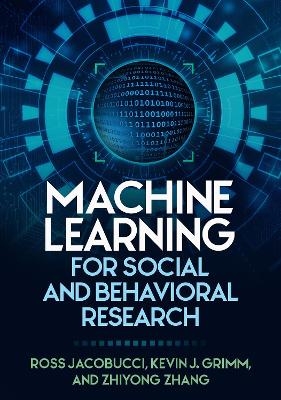
Machine Learning for Social and Behavioral Research
Guilford Press (Verlag)
978-1-4625-5292-4 (ISBN)
Ross Jacobucci, PhD, is Research Assistant Professor in the Center for Healthy Minds at the University of Wisconsin–Madison. His research interests include the development and application of machine learning for clinical research, with a focus on suicide and nonsuicidal self-injury. Dr. Jacobucci is an active developer of open-source software for the R statistical environment. His website is www.rjacobucci.com. Kevin J. Grimm, PhD, is Professor of Psychology at Arizona State University. His research interests include multivariate methods for the analysis of change, multiple group and latent class models for understanding divergent developmental processes, nonlinearity in development, machine learning techniques for psychological data, and mathematics and reading ability development. Dr. Grimm is a recipient of the Early Career Research Award and the Barbara Byrne Book Award (for Growth Modeling: Structural Equation and Multilevel Modeling Perspectives) from the Society of Multivariate Experimental Psychology. Zhiyong Zhang, PhD, is Professor in Quantitative Psychology in the Department of Psychology at the University of Notre Dame, where he directs the Lab for Big Data Methodology. He has conducted research in the areas of Bayesian methods, structural equation modeling, longitudinal data analysis, and missing data and non-normal data analysis. His recent research involves the development of new methods and software for social network and text analysis. Dr. Zhang is the founding editor of the Journal of Behavioral Data Science. His website is https://bigdatalab.nd.edu.
I. Fundamental Concepts
1. Introduction
- Why the Term Machine Learning?
- Why do We Need Machine Learning?
- How is this Book Different?
- Definitions
- Software
- Datasets
2. The Principles of Machine Learning Research
- Overview
- Principle #1: Machine Learning is Not Just Lazy Induction
- Principle #2: Orienting Our Goals Relative to Prediction, Explanation, and Description
- Principle #3: Labeling a Study as Exploratory or Confirmatory is too Simplistic
- Principle #4: Report Everything
- Summary
3. The Practices of Machine Learning
- Comparing Algorithms and Models
- Model Fit
- Bias-Variance Tradeoff
- Resampling
- Classification
- Conclusion
II. Algorithms for Univariate Outcomes
4. Regularized Regression
- Linear Regression
- Logistic Regression
- Regularization
- Rationale for Regularization
- Alternative Forms of Regularization
- Bayesian Regression
- Summary
5. Decision Trees
- Introduction
- Decision Tree Algorithms
- Miscellaneous Topics
6. Ensembles
- Bagging
- Random Forests
- Gradient Boosting
- Interpretation
- Empirical Example
- Important Notes
- Summary
III. Algorithms for Multivariate Outcomes
7. Machine Learning and Measurement
- Defining Measurement Error
- Impact of Measurement Error
- Assessing Measurement Error
- Weighting
- Alternative Methods
- Summary
8. Machine Learning and Structural Equation Modeling
- Latent Variables as Predictors
- Predicting Latent Variables
- Using Latent Variables as Outcomes and Predictors
- Can Regularization Improve Generalizability in SEM?
- Nonlinear Relationships and Latent Variables
- Summary
9. Machine Learning with Mixed-Effects Models
- Mixed-Effects Models
- Machine Learning with Clustered Data
- Regularization with Mixed-Effects Models
- Illustrative Example
- Additional Strategies for Mining Longitudinal Data
- Summary
10. Searching for Groups
- Finite Mixture Model
- Structural Equation Model Trees
- Summary
IV. Alternative Data Types
11. Introduction to Text Mining
- Key Terminology
- Data
- Basic Text Mining
- Text Data Preprocessing
- Basic Analysis of the Teaching Comment Data
- Sentiment Analysis
- Topic Models
- Summary
12. Introduction to Social Network Analysis
- Network Visualization
- Network Statistics
- Basic Network Analysis
- Network Modeling
- Summary
References
| Erscheinungsdatum | 26.06.2023 |
|---|---|
| Verlagsort | New York |
| Sprache | englisch |
| Maße | 178 x 254 mm |
| Gewicht | 740 g |
| Themenwelt | Geisteswissenschaften ► Psychologie ► Allgemeine Psychologie |
| Informatik ► Theorie / Studium ► Künstliche Intelligenz / Robotik | |
| Medizin / Pharmazie ► Medizinische Fachgebiete ► Psychiatrie / Psychotherapie | |
| Sozialwissenschaften ► Soziologie ► Empirische Sozialforschung | |
| ISBN-10 | 1-4625-5292-7 / 1462552927 |
| ISBN-13 | 978-1-4625-5292-4 / 9781462552924 |
| Zustand | Neuware |
| Informationen gemäß Produktsicherheitsverordnung (GPSR) | |
| Haben Sie eine Frage zum Produkt? |
aus dem Bereich


